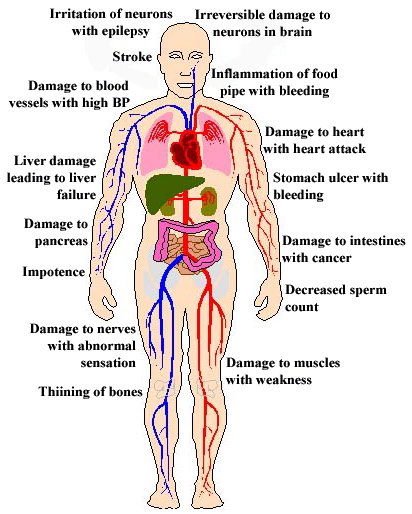Alcoholism
Alcoholism
Alcoholism is a disease. Alcoholics have a genetic (or inherited) deficiency of opiate receptors in the brain. Therefore, they do not experience pleasure with social, leisure, and competitive activities which would produce endorphins in a non-alcoholic.
When an alcoholic begins to take alcohol, he begins to experience a little pleasure. To experience more pleasure he has to take more alcohol. Withdrawal from alcohol shuts off the pleasure circuit, causing him to crave for alcohol to restore pleasure or avoid negative feelings. He becomes obsessed with alcohol and is unable to control his drinking.
The warning signs of alcoholism are: drinking in order to relax or forget; gulping down each drink quickly; beginning to lose interest in family; constantly thinking about alcohol; drinking during working hours; tremors, specially of hands, when unable to get a drink; aggressive or extravagant behaviour with a few drinks; developing relationships mainly with others who drink etc. Alcoholics also find excuse to drink.
Alcoholism is a disease that is caused by deficiency of chemicals in the body.
Pleasure is produced by stimulation of opiate receptors in the brain. Opiate receptors are a type of protein found in the brain. Stimulation of the opiate receptors results in feelings of reward. It also activates pleasure circuits in the brain by causing a larger amount of dopamine to be released in the nucleus accumbens. This causes a rush, or intense feelings of euphoria or pleasure, followed by relaxation and contentment. Normally the body produces chemicals known as endorphins that stimulate the opiate receptors and produce pleasure. Endorphins are released during exercise, sexual intercourse, intense emotional experiences, transcendental meditation etc. In the normal person a small amount of alcohol stimulates the opiate receptors and gives adequate pleasure so he does not need to drink more alcohol.
Non-alcoholic social drinkers get enough pleasure and anxiety relief due to adequate internal stimulation of receptors in centers for producing pleasure and relieving anxiety. They do not need extra stimulation, and can derive pleasure from social, leisure, and competitive activities. They can drink one or two pegs every day or in social occasions, or use drugs experimentally, and not become “hooked” (dependent) on alcohol or drugs.
A person prone to alcoholism has a deficiency of opiate receptors in centers for producing pleasure and relieving anxiety in the brain. Therefore he does not experience pleasure with usual endorphin-producing activities. When he begins to take alcohol he begins to experience a little pleasure. In order to experience more pleasure he has to keep taking more alcohol. This leads to excessive release of dopamine and activation of the reward system and results in addiction.
Excessive drinking alter the levels of the neurotransmitters in the brain, causing the person:
- to crave alcohol to restore good feelings or to avoid negative feelings,
- to become obsessed with alcohol, and
- to be unable to control how much they drink,
even though the drinking is causing serious problems with relationships, health, work and finances.
Other factors that lead to alcoholism include:
- Genetic vulnerability to develop alcoholism or other addictions.
- High levels of stress, anxiety or emotional pain that release stress hormones which may be associated with alcoholism.
- Low self-esteem or depression may
- Having friends who drink regularly
- The glamorous way that drinking alcohol is portrayed in advertising and in the media
Alcoholism is a treatable disease. Medications, Talk-Therapy, Cognitive / Coping Therapy, and self-help groups can speed the way to recovery.

ADVERSE EFFECTS OF ALCOHOLISM
Click bottom right corner to enlarge
Warning signs of alcoholism
- the need to drink to produce relaxation
- drinking for the sedative effect of alcohol(drinking to forget)
- constantly thinking about alcohol
- gulping down each drink quickly
- aggressive or extravagant behaviour with a few drinks
- developing relationships MAINLY with others who drink
- beginning to lose interest in family in preference to alcohol
- staying away from work more often
- drinking even in the daytime
- lying and stealing to get alcohol
- blackouts (gaps in memory)
- tremors, specially of hands, when the person is unable to get a drink
- increasing problems in personal relationships
- alcohol related physical problems and mental disturbances
Treatment:
Alcoholism is treatable. In most cases, a short period of hospitalization is required (maybe upto 2 weeks) while the system adjusts to the absence of alcohol.
Medicines are needed to help the person overcome the uncomfortable withdrawal symptoms that can occur from stopping alcohol. There are also many new forms of medication available, to help a person give up alcohol. Some of these can create a strong dislike for alcohol, so that the person no longer wishes to drink. However, these must always be used with a psychiatrist’s supervision, as they can be harmful if used improperly.
A good diet and vitamins are needed to make up for all the nutrients lost from drinking. Alcoholism can lead to many psychiatric disturbances besides blackouts – mental confusion, hallucinations, memory disturbances -these require to be treated.
Family therapy is necessary to help build up support for the person, as well to help the family members cope with the problem. Because alcoholism leads to problems in family relationships, these too may require working through with some outside help.
All these methods require long term therapy relapse prevention & rehabilitation as even one drink may lead to relapse.
Those who have a problem with alcohol, but do not display all the characteristics of alcoholism are said to “ABUSE” alcohol. This means that they engage in excessive drinking that causes health or social problems, but may not be dependent on alcohol.
Call Today
95661 33660
